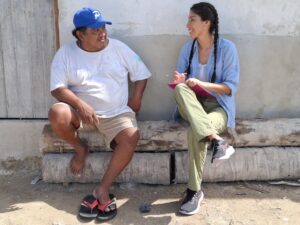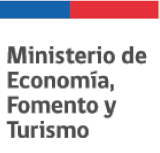


The project is financed by the Chile-Mexico Fund and is executed by public institutes IFOP and IMIPAS, which incorporates the principles of gender equality, inclusion, aquaculture-fisheries technology training, and climate change.
Santiago, December 11, 2024.- A total of 17 people from the Fisheries Development Institute (IFOP) of Chile, together with the Mexican Institute for Sustainable Fisheries and Aquaculture Research (IMIPAS), were trained within the framework of the cooperation project, which aims to develop co-management processes for small-scale fisheries, with an emphasis on benthic resources on Chiloé Island, Ancud Bay, in southern Chile; and in the towns of Celestún, Sisal, Progreso and Río Lagartos in Yucatán, Mexico, which incorporate the principles of gender equality, inclusion, aquaculture-fishing technology training and climate change.
This initiative, which began its implementation last August, included three training sessions that were given by professionals from the Mexican non-governmental organization Comunidad y Biodiversidad A.C. (COBI), Neyra Solano and Ana Campa, both with extensive experience in gender and social justice, in which they addressed the following topics: links between gender, the fishing sector and marine conservation, women’s work and the circle of invisibility; situations that lead to gender inequalities, how inequalities impact sustainability and conservation; strategies for incorporating the gender perspective; basic concepts on gender studies; foundations for gender work in fishing and conservation organizations; key elements for incorporating the gender perspective in the organization; development of projects with a gender perspective; inclusive and non-sexist communication in the fishing sector, among others.
In addition, in Mexico two semi-structured interview formats were carried out (one for women and one for men) to characterize the expressions of masculinity in the fishing sector and, in parallel, a survey was developed to evaluate the participation of women in the fishing value network, which will be applied in Chile in the following months. In Mexico, 47 interviews have already been applied to people from the fishing sector of Celestún and Progreso, located in the state of Yucatán.
Neyra Solano indicated that the present study will allow us to understand part of the social dynamics of these fishing communities and glimpse the possibilities of participation of women in the decision-making processes of sustainable fishing and aquaculture. “Identifying the differences and common points between regions and in turn between countries will be very useful to design a shared strategy that promotes equality at sea,” said Neyra Solano. “Sustainability cannot be achieved without gender equality, which is why training in this area is essential to understand how gender studies are linked to oceans and fisheries, and thus, from our organizations, we can incorporate actions that contribute to reducing gender gaps,” she added.
Meanwhile, the project director for the Chilean side, IFOP senior researcher Nancy Barahona Toledo, highlighted that gender training is a relevant pillar for the development of the project and was received with great interest by the work team. “Today, these trainings contribute to a transformative process where knowledge, techniques and tools are provided to develop skills and changes in people’s attitudes and behaviors. Societies need to be more inclusive and recognize the need to promote gender equality, which is achieved through training of this type, which will allow this knowledge to be transferred to the activities that we must carry out both in Chile and in Mexico with the artisanal fishing sector. This learning undoubtedly helps women and men to understand the role that gender plays in our work and family environments.” Finally, she indicated that training on gender issues allows us to “observe behaviors and patterns that perpetuate inequality; the need to make changes in language to create new realities by making women and men visible and assuming the responsibility of doing things differently.”
This project is funded by the Chile-Mexico Joint Cooperation Fund, the result of the Strategic Partnership Agreement signed between the Republic of Chile and the United Mexican States in 2006 and is managed by the Chilean Agency for International Development Cooperation (AGCID) and the Mexican Agency for International Development Cooperation (AMEXCID). Since its creation, this Fund has financed the execution of more than 230 initiatives.




